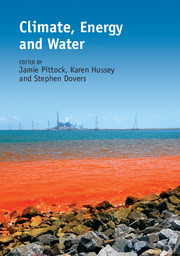Book contents
- Frontmatter
- Contents
- List of contributors
- Acknowledgements
- 1 Justifying, extending and applying “nexus” thinking in the quest for sustainable development
- 2 Water resources, climate change and energy
- 3 Implications of climate change for energy systems in a multisectoral context
- 4 Fossil fuels and water: A complex and evolving relationship
- 5 Renewable energy and water
- 6 Hydropower within the climate, energy and water nexus
- 7 Water and biofuels
- 8 Trade-offs and synergies between water and energy use in rural Australia
- 9 Management of the urban energy-water nexus
- 10 Managing the electricity-water nexus in China, France, India and the United States
- 11 Cross-sectoral governance of the climate, energy and water sectors: A ‘Rubik's cube’ analysis of cross-sectoral co-ordination
- 12 Regulation of the nexus
- 13 Climate, energy and water: the potential roles and limitations of markets
- 14 Strategies to mainstream climate change, energy, water and food security nexus knowledge and skills
- 15 A nexus of nexuses: systemic governance for climate response
- 16 Integrated modelling of the energy-water nexus in the American West
- 17 Biodiversity and the climate, energy and water nexus
- 18 Consumers, food supply chain and the nexus
- 19 Future prospects in climate, energy and water research and policy
- Index
11 - Cross-sectoral governance of the climate, energy and water sectors: A ‘Rubik's cube’ analysis of cross-sectoral co-ordination
Published online by Cambridge University Press: 05 April 2015
- Frontmatter
- Contents
- List of contributors
- Acknowledgements
- 1 Justifying, extending and applying “nexus” thinking in the quest for sustainable development
- 2 Water resources, climate change and energy
- 3 Implications of climate change for energy systems in a multisectoral context
- 4 Fossil fuels and water: A complex and evolving relationship
- 5 Renewable energy and water
- 6 Hydropower within the climate, energy and water nexus
- 7 Water and biofuels
- 8 Trade-offs and synergies between water and energy use in rural Australia
- 9 Management of the urban energy-water nexus
- 10 Managing the electricity-water nexus in China, France, India and the United States
- 11 Cross-sectoral governance of the climate, energy and water sectors: A ‘Rubik's cube’ analysis of cross-sectoral co-ordination
- 12 Regulation of the nexus
- 13 Climate, energy and water: the potential roles and limitations of markets
- 14 Strategies to mainstream climate change, energy, water and food security nexus knowledge and skills
- 15 A nexus of nexuses: systemic governance for climate response
- 16 Integrated modelling of the energy-water nexus in the American West
- 17 Biodiversity and the climate, energy and water nexus
- 18 Consumers, food supply chain and the nexus
- 19 Future prospects in climate, energy and water research and policy
- Index
Summary
Introduction
As previous chapters in this volume attest, there is a compelling case for cross-sectoral management of climate, energy and water. The interdependencies are tangible, the tradeoffs are becoming evident to the wider community and the framing of decisions that need to be taken are more focussed. This chapter approaches cross-sectoral co-ordination substantively as a matter of managing governance and institutional dynamics. Each of the sectors – climate (adaptation and mitigation), energy and water (with an emphasis here on urban water systems) – are considered within separate institution and governance frameworks. Each has their own institutional ‘logic’, comprising history, management culture, policy settings, statutory requirements, markets and operational practices (after Streeck and Thelen 2005). Many chapters in this volume are devoted to the technical aspects of the cross-sectoral nexus, but it is not until the institutional attributes of each of these sectors are defined that a systematic approach to alignment and co-ordination can be developed. Compared to the relatively mature technical analysis of climate, energy and water issues, the governance and institutional dimensions of cross-sectoral integration and co-ordination are relatively poorly examined and under-reported in the academic and policy literature (Kenway 2011). In this chapter, several key questions on cross-sectoral co-ordination are addressed:
• What are the governance and institutional components of the cross-sectoral ‘nexus’ that need to be managed?
• What are the inherent institutional similarities and differences between the climate, water and energy sectors? How do these enable or hinder effective management of this nexus?
• What would maximise the effectiveness of cross-sectoral governance?
In answering these questions, the chapter makes two significant contributions to the literature. First, we define and explore each of these three sectors as separate ‘institutions’ and consider cross-sectoral co-ordination as a task of institutional linkage and alignment; second, we frame this co-ordination task as one of co-ordinated governance or ‘meta-governance’, a task that requires purposeful and deliberative framing and enacting of co-ordination across institutionally different sectors, separate jurisdictions or levels of authority, and modes and mechanisms of governance.
- Type
- Chapter
- Information
- Climate, Energy and Water , pp. 172 - 197Publisher: Cambridge University PressPrint publication year: 2015
- 4
- Cited by



